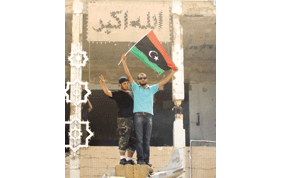AFP/Tripoli
Having fled before advancing rebels, Muammar Gaddafi’s whereabouts were cause for wild speculation yesterday—has he sought refuge in his hometown Sirte or exile in Venezuela or South Africa?

Libyan rebels wave their flag at Muammar Gaddafi’s Bab al-Aziziya compound in Tripoli yesterday
A day after fleeing his Bab al-Aziziya compound in Tripoli, the embattled strongman defiantly boasted that he went on a walkabout in the streets of the capital as insurgents swarmed the city.
Rebel fighters said they found no trace of Gaddafi when they swarmed his compound on Tuesday, raiding his armoury, raising their flag and ripping the head off a statue of the strongman.
“Bab al-Azizya is fully under our control now. Colonel Gaddafi and his sons were not there; there is nobody,” military spokesman Colonel Ahmed Bani said. “No one knows where they are.”
But there are many theories.
According to the rebels, who claim to control 90-95% of the vast North African country, Gaddafi may have headed for the desert in the south of Libya where borders are porous and easily breached.
“Muammar Gaddafi has only three choices: the desert Al Jufrah region, the Traghen oasis in the deep south on the border with Niger, or Sirte, his hometown,” said Abdel Moneim al-Huni, the rebel National Transitional Council’s envoy to the Cairo-based Arab League.
Gaddafi was reputedly born on June 7, 1942, in a Bedouin tent in the desert near the Mediterranean town of Sirte some 450km east of Tripoli.
He may have sought safety there among his Gaddadfa tribe, which is well armed and in command of the region.
Rebels have been trying to negotiate with tribal chiefs for permission to enter Sirte, a port known since antiquity where Gaddafi last year hosted an Arab summit.
If Gaddafi cannot find refuge among his own people, he may turn to other tribes, including the Tuareg of the Sahara, whom he allowed for years to carry out trans-border trade in exchange for stability in the region.
But some Tuareg have joined the ranks of the rebels, opening up a front in the deep south strategic region of Fezzan near the borders with Niger, Chad and Algeria.
Beyond the hot sand of the desolate southern desert, Gaddafi may also seek refuge across the border in Algeria, which never condemned Gaddafi in six months of uprising.
Media reports have suggested Gaddafi may travel to South Africa, claiming the country had sent planes to whisk away the longtime ruler and his family.
South African Foreign Minister Maite Nkoana-Mashabane, however, has rubbished the claims.
“Nobody has asked for asylum in South Africa, and as far as Johannesburg is aware, Gaddafi remains in Libya,” she said on Monday.
On another continent, Gaddafi could also turn to his friend and ally Hugo Chavez—a staunch supporter in the face of almost universal condemnation by countries around the world.
On Tuesday, as Gaddafi’s compound fell to the rebels, the Venezuelan leader proclaimed his unflinching support saying that in Libya there is “only one government, the one led by Muammar Gaddafi.”
Chavez, Gaddafi’s main supporter in Latin America, has consistently denounced the months-long Nato-led military operation in Libya as an oil grab by Western powers.
Ecuador, a Venezuelan ally, took a parallel diplomatic tack on Tuesday slamming what it called a Nato invasion of Libya—a position also echoed by Iran.
Burkina Faso’s Foreign Minister Djibril Bassole said yesterday his country would be open to receiving Gaddafi.
“If that is his wish, why not?” the minister said. “... if it were the guide Gaddafi’s wish to seek refuge in Burkina Faso ... we would do what it takes,” he said.
Nicaragua said on Tuesday that it too, may act as a host.
“If someone were to request asylum we would have to give a positive answer because (Nicaraguan) people were granted asylum when people were being murdered by (Nicaragua’s Anasatasio) Somoza dictatorship,” Bayardo Arce, President Daniel Ortega’s adviser for economic affairs, said without mentioning Gaddafi by name.
Ortega has been a vocal supporter of the Libyan leader, recently calling him a “brother” and “friend.”

